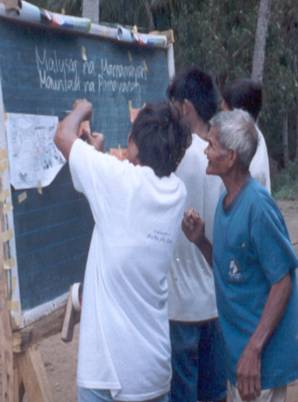Mobile Teachers: Educating Marginalized Filipinos
I was reading an article in the newspaper one morning about how mobile teachers in the Philippines are bringing learning to where it is most needed. They are doing this gargantuan task with the support of the Department of Education – Alternative Learning System Program but mostly with their firm belief that every one deserves to have access to education. It doesn’t matter if they have to climb mountains and cross rivers. Mobile teachers go where they are needed.
What is the Alternative Learning System?
The ALS is a ladderized, modular, non-formal education program that specifically targets dropouts in elementary and secondary schools, out-of-school youths, non-readers, working adults, and senior citizens who wish to have access to education. It provides an alternative or option to Filipinos who find it difficult or impossible to attend traditional classes due to various reasons. ALS students have the advantage of choosing their schedules based on their preference and availability. It has to be noted that these students are unlike traditional students as to circumstances.
The program is able to offer school-based or community-based classes. It provides for uniform lesson modules for all academic subjects including. Students usually start from the elementary level regardless of age unless they have already graduated from elementary in previous formal schooling. In this case, these students can be admitted to the secondary level. In the program set-up, there is a need for mobile teachers who will bring the education to the students instead of the other way around.
The Challenges Faced by Mobile Teachers
As if the challenges faced by teachers of today in regular classrooms are not enough, mobile teachers in the Philippines face even more challenges when they say yes and be one under the ALS Program of the Department of Education. These teachers are always on the move and will probably never get to teach in a regular classroom setting as long as they are hired as such. They may be assigned to hard-to-reach areas and traveling to and fro may not be comfortable to say the least.
All ALS mobile teachers are licensed teachers. To reduce the expected difficulty in commuting and communicating, residents of the target community are the priority candidates among possible teacher-applicants. They must also be able to communicate in the local language or dialect. Because of the inconsistency of physical conditions depending on the assigned learning areas, mobile teachers must also be physically fit to rise to the challenge and rigors of mobile teaching.
The Goals
The ALS mobile teachers have been tasked to make education accessible to the above-mentioned target groups. In so doing, it is also expected that they will be able to raise the literacy level in remote and underserved areas. It is hoped that when these are accomplished, the quality of lives of individuals and families will greatly improve.
My Say
Let us rewind a little to my introduction. While I was reading the newspaper, my youngest daughter who was busy drawing super heroes asked me if there are superheroes who don’t fly. Why I said, of course I know of some. I told her there are heroes that don’t wear capes and colorful costumes while saving people. They walked and talked like most people do and they are called mobile teachers.















Amber NElson
Any way to learn is a good way to learn! People need education.